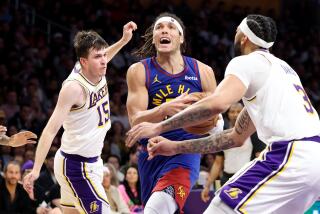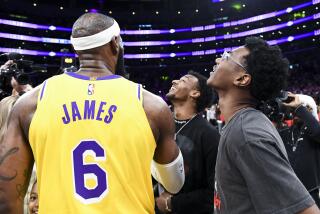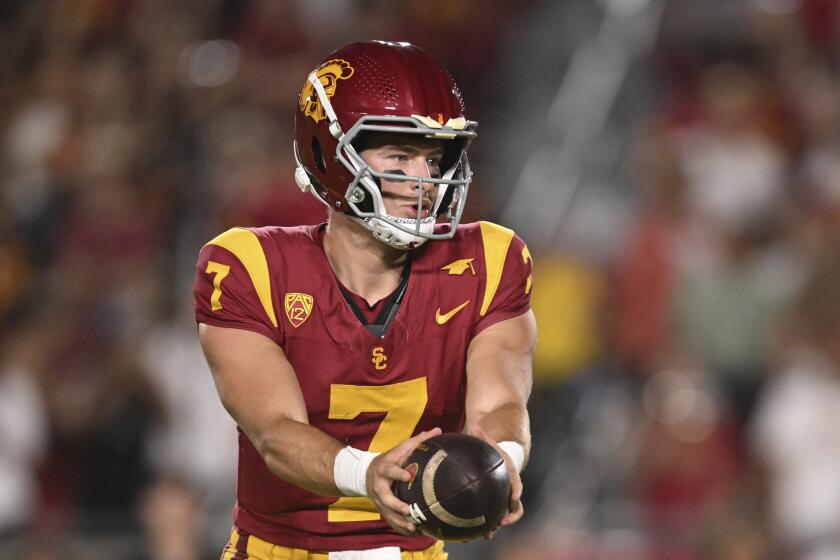Race caller Frank Mirahmadi lives life one gamble at a time
Frank Mirahmadi was in control of every aspect of his life on a recent chilly Northern California afternoon.
Sitting, moving, mostly standing in the small heaterless confines of an outdated announcer’s booth perched on the edge of the roof at Golden Gate Fields, Mirahmadi went effortlessly between his life story and the act of being the eyes and ears of the betting public at this 76-year-old horse-racing track.
A story about how he got into the business is interrupted for a mere second as he turned on the prerecorded bugle’s call to post. Another story about his impersonations, halted seamlessly as the horses load into the gate. And then his call of the race, effortlessly and accurately done with a stretch call that gets even the most disinterested excited about the outcome. Then back to the stories.
Such as him almost becoming a cable television star, or last year, when he had one of the country’s best jobs at Oaklawn Park in Arkansas. He quit without warning to audition for the race caller’s job at Santa Anita. It’s the only job he ever wanted. He didn’t get it, losing, by his count, for the sixth time to his good friend, Michael Wrona.
He lands on his ability at Monmouth Park in New Jersey, only to leave the booth unexpectedly and with a life-altering look at his mortality.
If stories are the currency to which you mark your life, Mirahmadi should be well into his 100s. His existence has been a collection of chances — some might call gambles — with outcomes between good and not so.
Mirahmadi is 49 and his body is debating how many more stories it will allow him to tell. He has Stage 3 colon cancer and after two surgeries is undergoing chemotherapy.
“I’m running out of stages,” Mirahmadi said with a laugh. Yet, in a more confident breath, insists he’s “a heavy favorite.”
Frank the impersonator
Understanding who is the real Frank Mirahmadi can be tricky. His forceful bravado can be quickly tempered by thoughtful introspection. Whenever he talks about his parents his voice gets low and exudes a reverential kindness you don’t hear when he’s selling. And he loves to sell.
He’s a Southern California boy by birth, and if he had his geographical way, by choice. He was reared in Beverly Hills, (“90212, not 90210 with all the fancy, schmancy stuff”) and his father would take him to the race track whenever he could.
“It’s in my DNA, no question about it,” Mirahmadi said. “I was bred that way.”
It was sometime in high school he realized he had a knack for impersonation and track announcers were his target.
His announcing career started when he browbeat Hollywood Park into letting him call two races on closing day (Dec. 24, 1992) imitating Trevor Denman and Harry Henson, two legendary race callers.
“I’m in sales and I just kept pushing,’ Mirahmadi said. “No just means yes is coming soon.”
It went well but it also went nowhere.
Fast forward to 1994 and Mirahmadi cold calls Wrona and asks for help. Mirahmadi needed some tapes in his own voice if he was ever going to make it in the business.
“I expressed to him several times that I wished he didn’t do as many impressions,” Wrona said “It’s not because they weren’t brilliant or entertaining, but they were inhibiting his potential progress as a serious announcer.”
Wrona was calling races at Blue Grass Downs in Paduca, Ky., and found a spot for Mirahmadi to call a few races. Mirahmadi drove from Florida to Kentucky for his chance.
“I remember congratulating him on his first call and I remember a three-word critique of his second. ‘Mate, you bounced,’ ” Wrona said, using the race-track term for a horse that follows a good performance with a bad one.
Mirahmadi was able to follow that up with some fill-in work before he got the Hialeah job in 1996. He would travel the country and call at tracks that no longer exist and were too small to remember. But in 2000, he got his big break, until things went bad.
Frank has a problem
Mirahmadi got a call from Louisiana Downs for a job from June to November. It was a perfect complement to Hialeah. Later, Louisiana Downs added a quarter-horse meeting and Mirahmadi, for the first time, had year-around employment in horse racing.
It’s also where Mirahmadi’s “excess wagering” caught up with him.
Mirahmadi said his bet of choice was sports, not racing, and that he very rarely bet on a race that he called.
“It was all my own doing,” Mirahmadi said. “I stepped on my own foot.”
Mirahmadi was let go in early 2006 for violation of company policy, which was betting, after Harrah’s bought the track.
“It was a blessing in disguise and I was crushed to lose that job,” he said.
Mirahmadi is quick to click off the dates of the subsequent three years when he didn’t place a bet.
“I’m not going to tell you I never place a bet anymore,” he said, adding that he no longer has a problem. “If it wasn’t for the sports betting I would have never said I even had a problem.”
It was a matter of months and Mirahmadi got a job on the California fair circuit. He was also able to pick up some other jobs such as Turf Paradise, where in 2009 he called the Hasta La Vista Handicap, using 23 different voices.
Frank finds a trusted friend
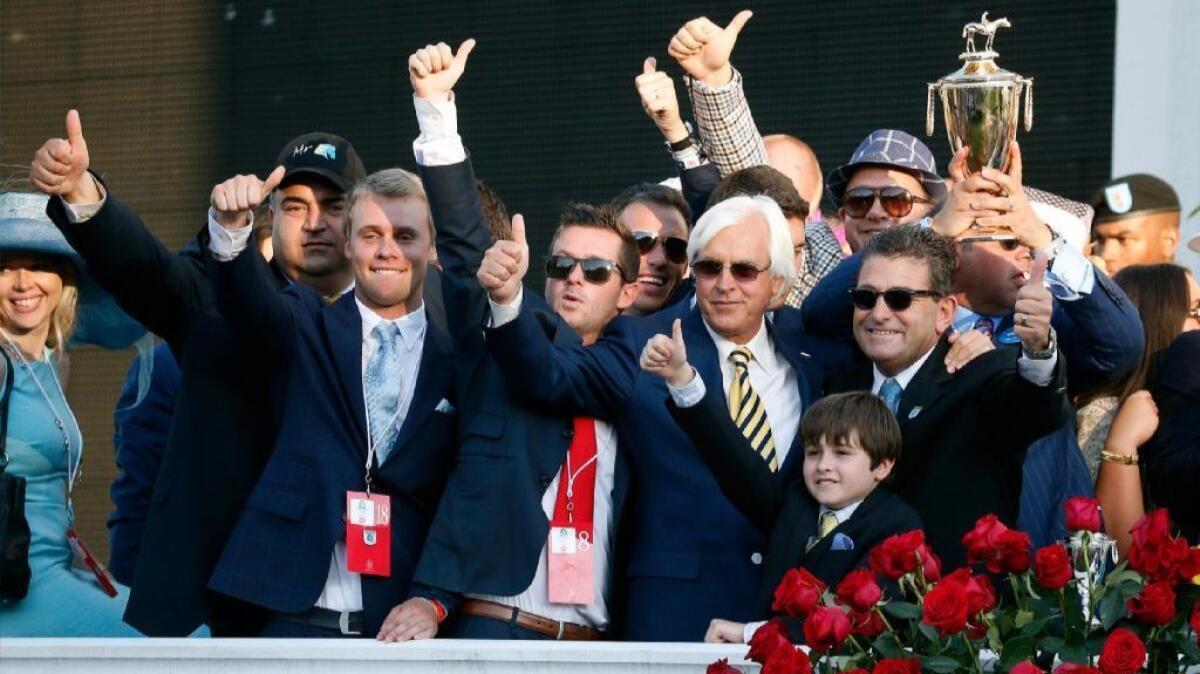
Among Mirahmadi’s many jobs was when he worked in publicity at the Fair Grounds in New Orleans. He was sent to California to try and recruit horses to run in the Louisiana Derby.
“I had never met Bob Baffert,” Mirahmadi said. “But there he was sitting in Clockers’ Corner. I walk over to him and he’s looking at me like, ‘Who is this guy?’ I say, ‘Bob, I’m Frank Mirahmadi and I’m the one that does the (trainer Wayne) Lukas imitation.”
Before long Mirahmadi talked Baffert into running Kafwain in the Louisiana Derby.
“He’s so talented,” Baffert said. “He could be a stand-up comic. He would be great on radio. But his love has always been announcing racing. He’s a really smart guy.”
They have developed a close, personal relationship.
“If I needed to I would leave (son) Bode with Frank for a week,” Baffert said. “I trust him that much.
“If I could afford it, I’d hire him just to hang around the barn and keep us all entertained.”
Instead, according to Mirahmadi, Baffert got him a job at TVG. (“I just put in a good word. He sells himself,” Baffert said.)
Tony Allevato, then the executive vice president and executive producer at TVG, took the recommendation and before long Mirahmadi was doing both on-air work and advertising sales.
“He was really good and I started using him on a regular basis,” Allevato said. “But I don’t want you to do impressions, I told him. A lot of people didn’t realize how good he was as a handicapper.”
He took over their ad sales in 2012 and was working as a contract employee until the relationship ended last year.
It was during the time at TVG that Mirahmadi had his next disappointment.
Frank the TV star
It seems fitting that one of Mirahmadi’s worst pieces of luck involved an HBO series called Luck. The story line was about a collection of race trackers — jockeys, trainers, owners, and bettors — and it was shot at Santa Anita. David Milch was developing the show and he was a regular in the VIP room at Hollywood Park, as was Mirahmadi.
“David walks up to me one day and says I see you’ve been doing some things — TVG, Turf Paradise—and I want you to come to my office,” Mirahmadi said.
“I met with him, (executive story editor) John Perrotta and another guy and he says, ‘You’re Renzo.’ … He wrote that part for me. Renzo was one of four degenerate gamblers. So I was now planning on becoming a famous movie star. … [Milch] said ‘As long as I’m alive you’re Renzo.’ ”
But is being the model for the Renzo character really a compliment?
“Renzo was a guy who wasn’t the sharpest knife in the drawer but he had a good heart,” Mirahmadi said. “Does David just think I’m some goofball who is the kind of guy who is always thinking of other people but had his own demons? He felt that was me.”
Perrotta thinks the possible casting was a credit to Mirahmadi’s versatility.
“He is a total actor, he could play any part,” Perrotta said. “He could have been a stand-up comedian. He just had a passion for calling races. But he could do anything, still could. That particular part was someone who was extremely vulnerable and sensitive. It’s tough to play effectively. He would have been great for it.”
It never happened. Michael Mann was brought on to the show and took over casting decisions. Mirahmadi was out.
“That’s the second biggest disappointment in my life,” Mirahmadi said. “We all know what’s the biggest disappointment in my life.”
Frank chases his dream
In 2012, Mirahmadi got another break when he was offered the announcing job at Oaklawn Park.
“This was an opportunity to get into Grade 1 top class racing,” Mirahmadi said. “For me that was an enormous step up.”
He was an instant hit, popular in the community and part of the track’s marketing efforts. The winter/spring meeting at Oaklawn coupled with the fair meets in California seemed like a perfect fit. And then in Dec. 2015, Denman retired from Santa Anita and Mirahmadi wanted that job.
So, do you suddenly quit a top job at Oaklawn, days before the start of the season watching as the bridge burns behind you, for a chance at a job you probably weren’t going to get?
“I tried to talk him out of it,” Baffert said. “I told him he should stay at Oaklawn. I mean, I thought he had a chance, but he was going against Michael Wrona, who does a very nice job and was a good employee of the Stronach Group (at Golden Gate). It was tough.”
Mirahmadi understood the risk.
“Certainly I gave up an unbelievable job,” Mirahmadi said. “They (Oaklawn) were offended. Let’s put it this way, they had a guy there for one year and they didn’t look for me to come back. I would have gone back. I’m not too proud to say that.”
Four people were asked to audition for the Santa Anita job. Mirahmadi and Wrona would alternate three-week periods with a caller from Hong Kong and England grabbing one-week spots.
“I thought I was the favorite,” Mirahmadi said. “And I know that Michael is a better race caller than me. Look, he’s got a great voice. He’s got an amazing vocabulary. And if you understand the art of race calling — which I do — I know he’s better.
“But I thought I could beat him in this deal. I thought I could win over people in an emphatic fashion because of my style, which I thought would suit Santa Anita more than his, especially following Trevor.”
Joe Morris, senior vice president of West Coast operations for the Stronach Group and the person making the decision, agreed with Mirahmadi that Wrona was the better race caller.
Mirahamdi replayed — imitating Morris’ voice — how he learned he didn’t get the job. It was succinct.
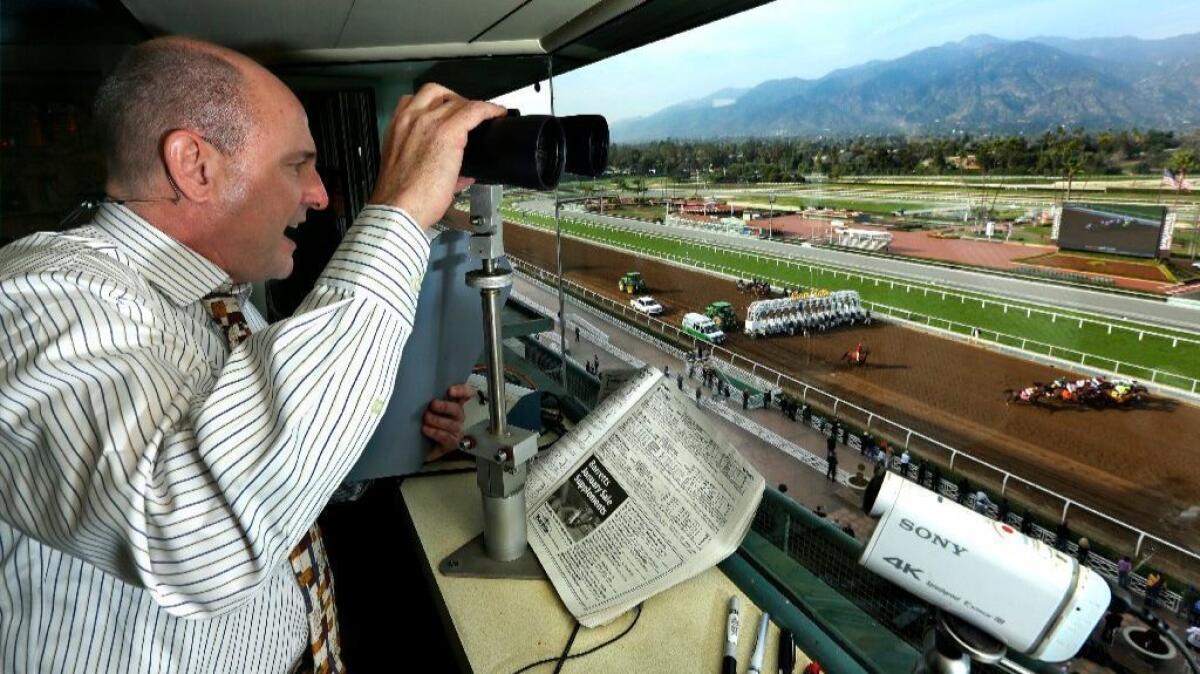
Morris subsequently offered Mirahmadi the Golden Gate job, but it partially conflicted with Monmouth in New Jersey, a job he had for a year. Things worked out. Monmouth paid Mirahmadi more money to stay and Morris said he could do Golden Gate part time.
Things were back on track for Mirahmadi, but not for long.
Frank faces mortality
Mirahmadi was loving life in New Jersey. He rented a place across the street from the ocean, he was walking more and had lost more than 10 pounds.
It was two weeks after the Haskell Invitational last year and he started having stomach cramps and pain. He consulted track physician Angelo Chinnici, who was fairly certain it was diverticulitis. Mirahmadi continued to call races as the pain increased.
It was Sunday and Chinnici was pushing Mirahmadi to go to the hospital.
“I’m not a big doctor guy,” Mirahmadi said. “The next day was going to be a day off and I wasn’t going to the doctor under any circumstance. I was just going to fight it off.”
Late on that day’s card, Mirahmadi uncharacteristically mixed up two horses on a call. This time Chinnici was insistent.
Mirahmadi finished the races stuck around to watch races from other tracks. He takes the elevator downstairs and Chinnici’s assistant was there to escort him to the hospital.
“The next thing I know I have a wrist band on and they are giving me something to drink because they want to do a scan,” Mirahmadi said. “I’m never thinking I was staying overnight.”
The next morning Dr. Eugene Zurkovsky told him he had an impacted colon and he needed immediate surgery.
The surgery lasted five hours and they discovered a tumor growing on the outside of his colon. They removed it along with about a foot of intestine. They also discovered some polyps elsewhere in the colon. He was told to have a colonoscopy in six weeks.
Mirahmadi returned to the booth in a couple weeks.
“So I go in and have the colonoscopy, not thinking there was anything wrong,” Mirahmadi said. “I figured it was like going in for a tuneup.”
Instead, he’s told there is cancer in his sigmoid and another surgery was scheduled.
It’s at this point that Mirahmadi decides it’s time to start shopping around. Jim McIngvale, known better as Mattress Mack, a well known horse owner, sets Mirahmadi up at the renowned M.D. Anderson Cancer Center in Houston. The recommendation was to take the entire colon out. Surgery was scheduled but Mirahmadi went looking again.
He got a consult at Sloan Kettering Cancer Center in New York, again one of the best. Then he met with Dr. Philip Paty, who explained his options.
On Nov. 16 he had the surgery. He lost about another foot of intestine and they found two lymph nodes with cancer, and with that he graduated from Stage 2 to 3.
Frank faces his future
The fact they found only two cancerous lymph nodes meant the staging was 3B. Four would have meant 3C. According to the American Cancer Society the five-year survival rate for 3B is 69%. For 3C it goes to 53%.
Mirahmadi is currently undergoing chemotherapy at UCLA. He goes every three weeks for the actual treatment and takes a strict regimen of pills in between. So far, things are going well, with some side effects, especially after an infusion.
“The way I look at it, like in a video game, I’m completely in bonus time right now,” Mirahmadi said. “Maybe being at Monmouth Park at that time was where I needed to be otherwise I might not have gone to a doctor. The colon was a day or two away from rupturing.
“Something like this makes you think, OK, [Santa Anita] was your dream job but I’m calling races in a beautiful environment every day. I like what I’m doing. I love the sport. I’m in California. I’ve got to be grateful, instead of worrying that I’m not going to call some of these other horses. My good friend is calling those races. It’s cool.”
Mirahmadi does have another concern that he may one day have to give up his favorite food: pizza.
“I don’t eat meat or fish or poultry,” he said. “The over-under on me eating pizza is about 360 days a year.”
Mirahmadi even thought about starting a pizza chain if he gave up race calling. He would be selling something he loves. He would be Frank.
Follow John Cherwa on Twitter @jcherwa
More to Read
Get our high school sports newsletter
Prep Rally is devoted to the SoCal high school sports experience, bringing you scores, stories and a behind-the-scenes look at what makes prep sports so popular.
You may occasionally receive promotional content from the Los Angeles Times.
